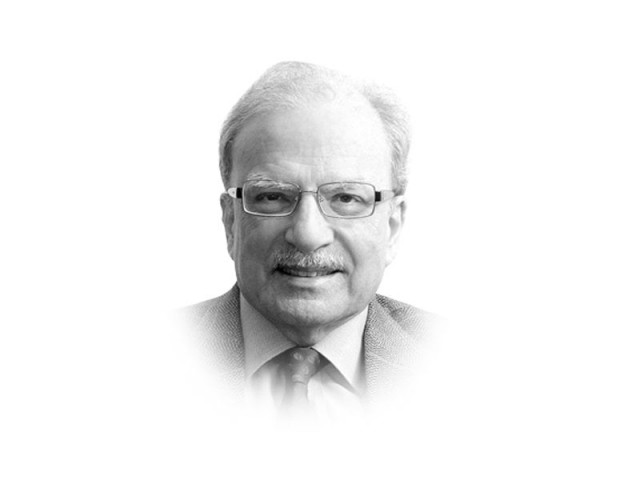America’s travails in Afghanistan
The developing situation in the war-torn country and Pakistan's involvement

The writer is a former caretaker finance minister and served as vice-president of the World Bank
The American Afghan effort is floundering. Asked in an interview by The Washington Post why Americans were still fighting in Afghanistan, President Trump’s answer reflected lack of understanding on his part. He said he was continuing the military presence in Afghanistan only because experts told him the United States needed to keep fighting there.
On November 25, the Americans lost three Special Forces soldiers when they went to the critically-important province of Ghazni where the Afghan forces had come under a great deal of pressure from the Taliban. This province is important since it is home to the Hazaras, the third largest ethnic group in the country after the Pakhtuns and Tajiks. The Hazaras also have a presence in Pakistan’s Balochistan. They follow the Shiite faith. Their province sits on the Kabul-Kandahar Highway that is an important link between the country’s capital and its southwest. Ghazni city had fallen to the Taliban but had been retaken by the Afghan forces. However, 18 of the 34 districts in the province are under the control of the Taliban.
The Taliban are not the only dissidents of concern for the Americans. It appears that al Qaeda is staging a comeback after having been all but wiped out of the country. It has resurfaced in the country’s southwest not far from the border with Pakistan. And Islamic State has established itself in the country’s southeast, again near the Pakistan border.
American casualties in the war were greatly reduced after the decision taken in 2014 by then president Barack Obama to end American combat operations. Since then, 42 American soldiers have died — ten in 2015, nine in 2016, eleven in 2017 and twelve in 2018 thus far. But the Afghan forces have suffered a great deal more. According to President Ashraf Ghani, 28,529 Afghan security forces have been killed since 2015, an average of about 25 deaths per day. This is not a sustainable rate of loss.
There are now 14,000 American soldiers in Afghanistan — half of them are for providing logistics support and training the Afghan forces. By comparison, there were 120,000 American and foreign troops in the country when Obama took the decision to start pulling out. The Afghan American-trained commando troops number 20,000 but are spread thinly in the 18 of the 34 provinces the government still controls. They have some air support but it is not effective. The Americans generally don’t carry out air strikes on behalf of Afghan troops unless they have their own people embedded with the local forces.
That the buildup of the government forces has not impressed the Taliban was evident from the pick-up in the attacks the insurgents have mounted in and around Kabul. The latest was on November 28 when President Ashraf Ghani was speaking at a UN-sponsored conference in Geneva. The assault outside a British security compound on the outskirts of Kabul sparked a gun battle that lasted for several hours and killed 10 people. A few days before this attack, the Taliban had struck a gathering of Sunni Islamic clerics in the capital. That had left 50 dead.
At the Geneva meeting, Ghani outlined a comprehensive five-part plan for peace talks with the Taliban. He named a 12-member negotiating team and declared that his government was seeking a peace agreement in which “the Afghan Taliban would be included in a democratic and inclusive society”. He also indicated that the next election to the country’s presidency would be held on April 20, 2019 as planned, dispelling the rumours that the government, given the deteriorating security situation, was thinking of postponing it. The plan he outlined was aimed at building a lasting peace and could take as long as five years to implement. It would start with negotiations among Afghans, then talks with Pakistan and the United States, and extend to other foreign powers, presumably China, India and Russia.
It was far from clear whether the plan would be acceptable to the Taliban who had been indicating that they did not consider the Ghani administration as legitimate, having been imposed on Kabul by the Americans. The Taliban were willing to talk to the United States and had held several discussions with the Afghan-born American emissary, Zalmay Khalilzad. What would be Pakistan’s involvement in this process?
In a couple of meetings I had with Ashraf Ghani — one in Washington when he was leaving the World Bank to join the government Hamid Karzai was putting together, and the other in Kabul when I went to the Afghan capital at his invitation — I had suggested a comprehensive programme for developing the tribal belt on both sides of the Afghan-Pakistan border. The aim would be to create a new economy which would provide well-paying jobs to the restive youth of the area. He was interested enough to ask me to invite Imran Khan to visit him in Kabul. I passed on the message to Khan but he has still to act on it.
Published in The Express Tribune, December 3rd, 2018.
Like Opinion & Editorial on Facebook, follow @ETOpEd on Twitter to receive all updates on all our daily pieces.













COMMENTS
Comments are moderated and generally will be posted if they are on-topic and not abusive.
For more information, please see our Comments FAQ